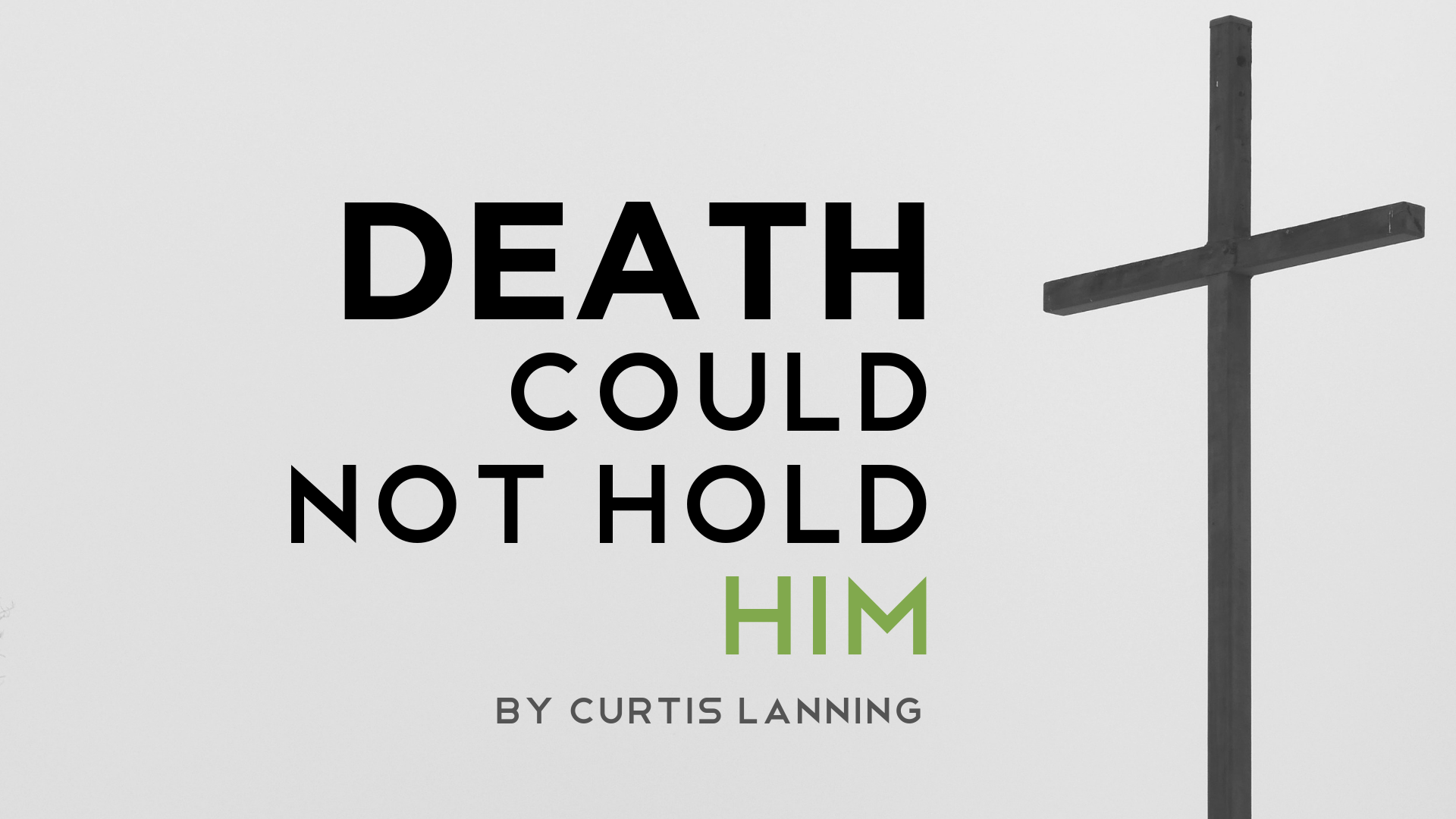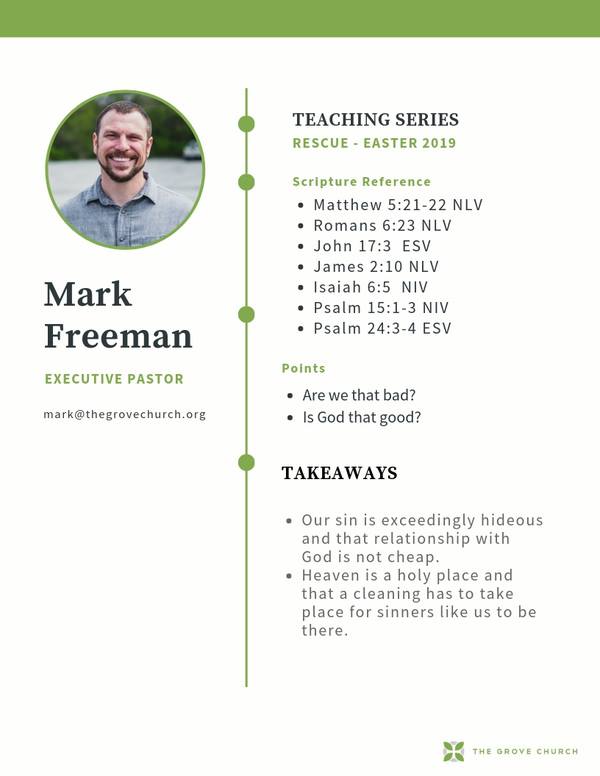
by Curtis Lanning
We don’t talk about death much in the church. That kind of discussion is usually reserved for funeral services. But seeing as death is a prominent part of the greatest miracle we celebrate on Easter, I figured it was worth writing about this week.
At my old church in Russellville we used to have a by-the-book old fashioned southern Bible pastor named Dan Lightfoot. He’s still around and still preaching, although at a different church now. He had this corny preacher joke (they all have a few, even Charlie). He said one Sunday, “The number one cause of death. . . is life.” It got a casual Sunday morning chuckle from parishioners. And believe me, that’s a lot for your average Church of Christ crowd.
Corny joke aside, Lightfoot had a point. And it may seem like a $5 philosophy bumper sticker to say we wouldn’t die if we didn’t live, but there’s truth there going back to creation.
We know death wasn’t the original plan. When God created Adam and Eve and gave them the Garden of Eden, he communed with them, his perfect self with their, at the time, flawless existence. He walked with them in the cool of the evening. I’d like to know what they talked about . . . or even if they talked. But as we know, when Original Sin entered the picture, that came with severe consequences that still impact us to this day.
One of those consequences was death. We weren’t originally meant to die. Man was supposed to reside in the garden with the splendor of the Lord. But one action changed all of that. Paul writes about the consequence of sin in Romans 5:12:
“Sin came into the world through one person, and death came through sin. So death spread to everyone, because everyone sinned.”
>
“Sickness, evil, hate, all the worst things in this world came as a result of that sin. But the strongest force of all these things is death. There is no escape from it.”
From that day forward, we were all doomed to die. Sickness, evil, hate, all the worst things in this world came as a result of that sin. But the strongest force of all these things is death. There is no escape from it. King Solomon, the wisest man to walk this planet (aside from Christ), spent much of his life studying all the mysteries. One of his conclusions was everyone shares the same fate, no matter how good or bad they are in life.
He writes in Ecclesiastes 9:3:
“This is the tragedy of everything that happens under the sun: Everyone shares the same destiny. Moreover, the hearts of mortals are full of evil. Madness is in their hearts while they are still alive. After that, they join the dead.”
Dread it. Run from it. Destiny arrives all the same.
Another consequence of Original Sin was separation from God. We can no longer be in his presence because of our corruption. Perhaps the person who has gotten closest to seeing God since Adam brought sin into the world would be Moses. And even he didn’t get to look upon God’s face. Exodus 33:18-23 details that story:
“Then Moses said, ‘Please let me see your glory.’ The Lord said, ‘I will let all my goodness pass in front of you, and there I will call out my name ‘the Lord.’ I will be kind to anyone I want to. I will be merciful to anyone I want to. But you can’t see my face, because no one may see me and live.’ Then the Lord said, ‘Look, there’s a place near me. Stand by this rocky cliff. When my glory passes by, I will put you in a crevice in the cliff and cover you with my hand until I have passed by. Then I will take my hand away, and you’ll see my back, but my face must not be seen.’”
If we look upon the face of God, we die. Whether it’d be like that scene from Raiders of the Lost Ark, I don’t know. But what I do know is sin stays with us so long as we live. And God must be kept apart from sin. He simply cannot tolerate it being the ultimate being of justice. Habakkuk wrote that God’s “eyes are too pure to look at evil.”
That all stems from sin, from the choices we make to rebel from God. These are choices I’ve made and will continue to make as well.
That all sounds bad, and I know the majority of this blog post has been dark so far. But there is Good News.
Because God loves us, he put into place a plan to rebuild that bridge burned by sin. That plan involved him sending Christ to live among us, teaching us to turn from evil ways, then dying, becoming the ultimate sacrifice for all sin that ever was and would be, before finally coming back to life to demonstrate his ultimate power over death.
The resurrection of Christ became the model for what will eventually happen to everyone who accepts God’s free gift of salvation. Paul spells it out in Romans 5:21:
“As sin ruled by bringing death, God’s kindness would rule by bringing us his approval. This results in our living forever because of Jesus Christ our Lord.”
We always rightly focus on the resurrection of Christ. But sometimes we miss what makes it such a spectacular miracle. With all of its terrifying power, death wasn’t strong enough to hold Jesus. When Jesus appears to John via vision in Revelation 1, he says, “Don’t be afraid! I am the first and the last, the living one. I was dead, but now I am alive forever. I have the keys of death and hell.”
>
“This was no Jon Snow or Winchester resurrection. God informed death Jesus would be returning to life, post haste. And there wasn’t a thing death could do about it.”
What a claim! He didn’t somehow manage to slip through death’s grasp to return to life like we often see in the movies. This was no Jon Snow or Winchester resurrection. God informed death Jesus would be returning to life, post haste. And there wasn’t a thing death could do about it. “I have the keys of death!” Jesus says.
We see the power of God used to return people from the dead in a few places throughout scripture. Elijah resurrecting the widow’s son in 1 Kings 17 comes to mind. Then there’s the terrifying incident of a dead Moabite who was brought back to life simply from touching the deceased Elisha’s bones in 2 Kings 13. We even see Jesus resurrect people like Jairus’s daughter in Mark 5.
But Jesus? He himself dies and then returns from the dead. He knew that would happen. When Lazarus died, he had no clue he’d be brought back to life in John 11.
That won’t be the last time Jesus shows His power over death. Eventually death will have to let everyone go, as shown in Revelation 20:13:
“The sea gave up its dead. Death and Hell gave up their dead.”
So you see? Death has no power over Christ. And after Jesus returns, it won’t hold power over us anymore, either. As we celebrate the resurrection of God’s Son this Easter, let’s remember, there’s a time coming when death will be no more. And that’s because of Jesus’ sacrifice.
Like Paul wrote in 1 Corinthians: “Where, O death, is your victory? Where, O death, is your sting?


